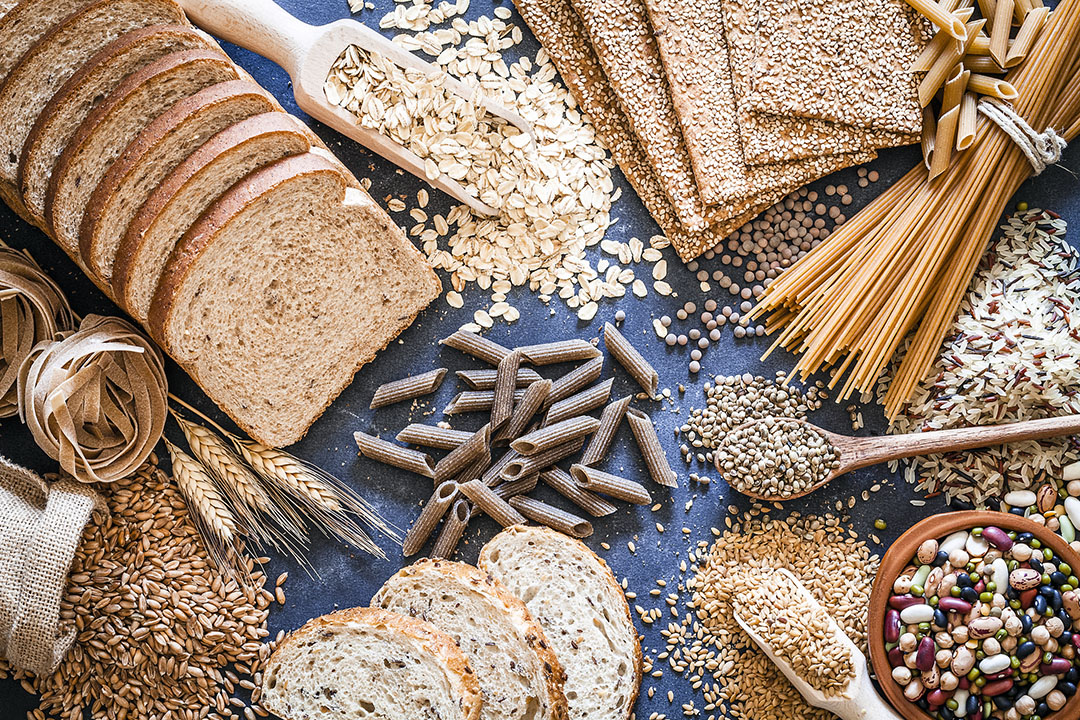“Gluten-free” is no longer a term used only by the Celiac community. Now, gluten-free foods and diets have become popular among those with digestive problems, chronic pain and inflammation, and thyroid issues, plus those looking to simply improve their gut health.
Has your doctor recommended you try a gluten-free diet? Or perhaps you are just curious about the health benefits you could gain from eliminating gluten? If so, this blog will help you understand why gluten-free diets are so popular and help you make a smooth transition to a healthier gut without gluten.
Is Gluten Bad for You?
Gluten is a collective term that refers to certain types of protein found in wheat, barley, rye, and triticale. It’s what gives bread dough a glue-like, elastic consistency and baked bread that satisfying chew.
Gluten itself isn’t bad, but how our bodies react to it is where we can find trouble. Gluten proteins are highly resistant to our digestive enzymes. The incomplete breakdown of the gluten protein leaves large blocks of amino acids (the building blocks of proteins) in the gut which weakens the intestinal wall. Over time, these blocks break through the intestinal wall and cross over into the rest of the body.
What are Symptoms of Gluten Intolerance?
Many people experience gluten intolerance symptoms without even realizing that is the cause. This phenomenon is known as “leaky gut syndrome” and can be the root cause of many of the following symptoms:
- Abdominal pain
- Anemia
- Anxiety
- Bloating or gas
- Brain fog, or trouble concentrating
- Depression
- Diarrhea or constipation
- Fatigue
- Headache
- Irritable bowel syndrome (IBS)
- Joint pain
- Nausea and vomiting
- Skin rash
Symptoms of gluten intolerance can pop up several hours or days after eating gluten. But for some, like those with Celiac disease gluten poses a more severe problem than bloating and fatigue.
Celiac disease is a digestive condition in which the body develops a severe allergy to gluten proteins. When someone with Celiac eats food containing gluten, their body attacks its own tissues which damages the digestive system and prevents the uptake of nutrients.
Research also suggests that gluten can trigger or worsen symptoms in people with other autoimmune conditions, such Hashimoto’s disease (a condition that affects your thyroid), even if you don’t have any digestive side effects.
What is a Gluten-Free Diet?
Considering going gluten-free? First, let’s explore what eating a gluten-free diet means to make the most of it.
First and foremost, a gluten-free diet isn’t a get-slim-quick weight loss fad diet. While many people do notice improvements in their weight when they follow a gluten-free diet, this diet is not a fad or a miracle cure.
According to Mayo Clinic, “A gluten-free diet is an eating plan that excludes foods containing gluten. Gluten is a protein found in wheat, barley, rye, and triticale (a cross between wheat and rye).”
Many people think that avoiding gluten is as simple as skipping bread and pasta. But the reality is that gluten is in many different food and drink products, many of which you would never suspect! Following a gluten-free diet also means avoiding products like soy sauce, beer, non-dairy creamers, imitation meats, some cold cuts, processed foods, bouillon cubes, soups, sauces, salad dressings, seasonings, and other items.
For the average person, eating these products once in a while won’t sabotage your gluten-free lifestyle. But those with severe gluten allergies should be wary and read every label.
5 Reasons Why Eliminating Gluten Supports Your Gut Health
If you have Celiac disease, following a gluten-free diet is essential to your recovery. But, even if you don’t have a gluten allergy or gluten sensitivity, you can still benefit greatly from going gluten-free. In fact, many AlignLife Chiropractors recommend eliminating gluten to help your body heal faster. Here are five reasons why:
1) Gluten-free diets mean less bloating.
The most immediate benefit of eating gluten-free is a reduction in bloating, indigestion, and other belly troubles. The gluten molecule has an inflammatory effect on the digestive tract. This causes swelling and sluggish digestion even in those without a gluten allergy. By removing gluten, your gut inflammation subsides, bloating reduces, and digestion improves.
2) Going gluten-free helps you maintain a healthy weight.
Many people notice that they naturally lose weight and feel better after starting a gluten-free diet. This is likely due to the reduction in inflammation, swelling, and toxic build-up that comes with a diet high in gluten-containing foods.
Avoiding gluten also means avoiding a lot of processed, salty, sugary foods and cooking more at home. That means you’re likely giving more attention to nutrient-dense macronutrients like healthy fats, complex carbs, and proteins. This habit alone helps cut unhealthy calories and trim your waistline while still feeling satisfied.
Others may find that following a gluten-free diet helps them put on healthy weight. In those with an allergy, gluten damages the intestinal lining which makes absorbing nutrients a challenge. Many people in this scenario struggle with nutrient deficiencies and unexplained weight loss. As the digestive tract has time to heal without the presence of gluten, they are able to absorb more nutrients from their food and reach a healthy weight.
3) Gluten-free diets help reduce aches and pains.
Gluten is an inflammatory protein for most people. And with inflammation comes pain. While this can manifest as digestive pain, this inflammation can also show up as joint pain, generalized aching, fibromyalgia, or headaches. Removing gluten prevents this inflammatory process. This allows your body to reduce or eliminate inflammation overall, help your body heal, and get rid of those nagging aches and pains.
4) Gluten-free diets lead to clearer skin.
Gluten has been linked to inflammatory, autoimmune skin conditions like eczema, psoriasis, and hives. Straying away from gluten also keeps you from eating the high-card, high-sugar, high-fat processed foods that also contribute to acne and other skin conditions.
5) Going gluten-free helps you boost your energy levels.
A boost in energy is one of the most common benefits reported by those who start on a gluten-free diet. If you do have gluten sensitivity, it takes energy to fight the ongoing inflammatory battle in your gut. Without the presence of gluten, you have that energy to use elsewhere. Studies also show that diets that are high in refined carbs are linked to fatigue, lethargy, and poor mood. Removing gluten means removing refined carbs, and your energy naturally returns to healthy levels.
How to Go Gluten-Free

1) Get savvy reading labels.
As we mentioned above, gluten hides in a lot of different foods and drinks that you would never expect. Read the nutrition labels and seek out products that say “gluten-free” and not “wheat-free” (as these may still contain gluten from another source). If you are hoping to fully eliminate gluten from your diet, avoid products that list wheat, rye, barley, oats, Brewer’s yeast, and malt.
2) Explore gluten-free cookbooks and recipe blogs.
With so many people adopting the gluten-free lifestyle, there is no shortage of recipes and inspiration. Whether you’re cooking for yourself or your family, you are bound to find simple, delicious gluten-free recipes everyone will love with just a few quick searches. Doing research now goes a long way in helping you build up your collection of go-to meals, which makes the transition much easier and more sustainable.
3) Use pre-packaged gluten-free snacks wisely.
As you embark on your gluten-free journey, you will likely find yourself standing in front of the gluten-free section of your grocery store. This section often boasts a growing range of gluten-free bread, tortillas, cookies, cakes, crackers, pasta, and more. These options make the transition into a gluten-free lifestyle easier.
But, don’t go overboard on packaged snacks, making them a staple in your daily diet. While these don’t contain gluten, they are still processed foods. Focus mostly on fresh, whole foods, and supplement with snacks like these as a treat, or when you are on the go.
4) Prepare for eating out at restaurants.
Thankfully, eating gluten-free at restaurants is getting easier as more people are going gluten-free. Look for restaurants that offer a gluten-free menu or have substitutions available.
Before going to any restaurant, it’s a good idea to plan ahead. Look at the menu and pick out a few options before arriving. Opt for salad dressings made “in-house’ as these are less likely to contain gluten than store-bought brands. And, don’t be afraid to ask your server about the best gluten-free options.
5) Support your gut with probiotics.
Along with transitioning to a nutritious gluten-free diet, make sure your gut has all the building blocks it needs to heal and thrive. Probiotics are one of the best ways to support your microbiome and promote healthy digestion.
But, not all probiotics are created equal. While many mainstream probiotics focus only on the number of bacteria in the capsule, Aceva’s Ultrabiotic also considers bacteria quality, age, and strain research to provide the best possible results. Take Aceva Ultrabiotic or Pedia-Biotic (kids) daily to enhance healthy gut flora and improve your digestive health.
Create Your Gut-Healthy Lifestyle
Removing gluten from your diet is a good step in the right direction for your gut health. But it’s just one piece of the puzzle. Great gut health also requires regular exercise, stress management, rest, and chiropractic care.
That’s right! Good spine health is essential to a healthy gut. When the spine is out of alignment, it negatively affects the nerves and blood vessels that go to the gut and cause a range of digestive disorders. Keeping your spine in alignment with regular chiropractic visits ensures that your digestive system has all the support it needs – and that you are reaping all the possible benefits of your gluten-free diet.
Schedule a visit at an AlignLife Center Near you! >
Give your gut the best chance of a healthy future with a well-rounded lifestyle that supports your gut health inside and out. Schedule a visit with your AlignLife Chiropractor today.







